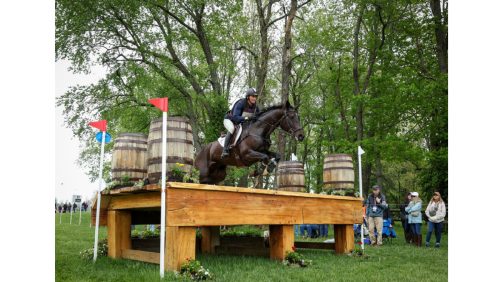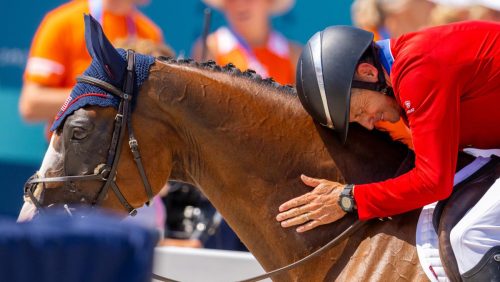The Blenheim Petplan CCI***, set amid the tranquil splendour of historic Blenheim Palace in Oxfordshire, England, seemed to do much to calm the storms that have been buffeting the sport of eventing and produced a hugely popular winner in Pippa Funnell.
Following the controversy of the Olympic medals in August and the tragedy and rider dissatisfaction at Burgh-ley (England) the previous weekend, Funnell’s friend and teammate William Fox-Pitt commented: “This is the first Friday night rider meeting I’ve been to at a three-day event where no one had any complaints about anything!”
And while Blenheim, which ran without steeplechase in preparation for next year’s European Championships, resulted in 21 retirements and 12 eliminations (four horse falls) out of 92 starters, the mood among riders and owners remained remarkably positive. Many seemed to accept they had simply not read the upgraded track correctly.
Funnell, the 2003 Grand Slam victor and newly crowned Olympic bronze medalist, made an impassioned speech at prize-giving, in which she extolled the virtues of the short format and director Mike Etherington-Smith’s cross-country course.
“Mike has done a fabulous job,” she said. “He designed a clever course, which just caused a lot of 20 penalties on the board. It was a proper jumping and thinking course. There’s nothing wrong with that, and it produced a competition with the right influences. This weekend has done a lot to enhance the case for short format.”
FEI eventing chairman Wayne Roycroft, who flew over from Australia to chair a rider meeting discussing concerns raised about communication at Burghley, agreed whole-heartedly.
New Zealander Andrew Nicholson who, naturally, made the track look easy, com-mented: “I am in favor of short format as long as the cross-country remains influential like this. In fact I would prefer to see 11-minute courses at this [three-star] level and even up to 13 minutes at four-star and championship level.”
A Course That Counted
The dressage phase, judged by Ireland’s David Lee as ground jury president with Britain’s Sue Baxter and Jane Tolley, was led by up-and-coming British rider Ruth Friend, 25, on Two Thyme. Funnell was the only other rider to score a sub-40 dressage mark (38.8).
Funnell, who has now made Blenheim her own with a record fourth victory, rode the stallion Viceroy. The horse was bred by accident at
Douglas Bunn’s All England Show Jumping ground at Hickstead when the American show jumping sire VIP jumped out one night and “eloped” with Sue Bunn’s Thoroughbred mare Sweet Sage 14 years ago.
The stallion, who has served more than a dozen mares this year, has a superb temperament and follows Funnell around like a dog. “We all love him to bits,” she said.
Simone Deitermann, reserve for the German Olympic team and paying her first visit to Blenheim, was third on Flambeau after the dressage, ahead of French first-timer Didier Willefert riding the Selle Franç¡©s Escape Lane Mili. German team member Ingrid Klimke, another Blenheim debutant, lay fifth on Robinson’s Concord.
But the dressage marking, which was admirably equal throughout, was to prove pretty much inconsequential. Fence 19, a parallel on a turn to two brush arrowheads on mounds, caused 23 mishaps–25 percent of the total faults.
ADVERTISEMENT
Etherington-Smith, creator of the Rolex Kentucky track, was at a loss as to why this complex was so influential and suggested the many problems around the course were partly due to the inexperience of some horses and riders.
However, fence 19 caused a run-out for the likes of Nicholson on his first ride, Henry Tanker-ville, and it was here that Friend’s challenge ended in retirement.
New Olympic champion Leslie Law ran out here with Fox On The Run, and Fox-Pitt ground to a halt on Moon Man, a talented but enigmatic horse who, following similar sulking incidents at England’s Badminton and Bramham events, seems to be declaring that he has had enough of eventing. “He needs a psychologist,” said Fox-Pitt resignedly.
Eight out of the first 25 riders ruined their chances early with run-outs at fence 4, a pair of angled brushes which proved the nemesis for two of the three U.S. riders. The 2003 U.S. Eventing Association’s Young Rider of the Year, Kristin Schmolze, fell off Cavaldi here, and London-based businessman Joe Giannamore, competing in his first three-star, had two stops on Horoscope before retiring five fences later. Schmolze got as far as fence 19 before she, too, called it a day.
Meanwhile, 19-year-old Laine Ashker, a student at the University of Virginia riding at her first event outside the States, parted company from her 13-year-old Thoroughbred Eight Saint James Place at the innocuous looking Dewpond, fence 7. However, she remounted determinedly and completed in a fast time, finishing the competition in 55th place.
Fence 11, a new combination of a spread with a turn to a corner, caused 11 faults, including one horse fall, when Klimke and Robinson’s Concord got too close to the corner and landed steeply on his nose. Klimke suffered a displaced shoulder bone.
Four riders were taken to the hospital, but all were discharged that evening. Didier Willefert took the most serious fall when he was fired into the ground at a double of spreads, but his only lasting injury was a broken wrist.
Interspersed with the drama came several excellent rounds: there were 41 clears and five within the time. French riders Bruno Bouvier (Harry, 11th), Rodolphe Scherer (Hippolyte du Lyvet, 12th) and Marie-Christine Duroy (Crazy Love, 22nd) showed exactly how it should be done, and local rider Tristram Owers, eventual 18th on Classic Touch, finished right on the button, winning a swish pair of Italian riding boots as reward.
The young Portuguese rider Frederico Mexia de Almeida rose 65 places after dressage to finish 21st on Pegaso, and 20-year-old Dominic Ruane shot up 58 places to 25th on Highwayman. Both were riding at their first three-stars.
At the competitor briefing, Etherington-Smith had advised riders to take advantage of a talk from British team manager Yogi Breisner about warming up for the short format. The vets reported that horses were not finishing tired on the perfect going and were in good shape.
Five of the 64 finishers failed to come forward for show jumping, with Lucy Wiegersma’s In The Purple, lying fifth, being spun at the final trot-up.
A Well-Deserved Win
ADVERTISEMENT
Last year’s show jumping track at Blenheim proved highly influential, but designer Maureen Summers has retired, and her successor, Di Boddy, decided to begin her tenure with a more modest track, though it was still big enough.
Apart from Funnell, who had a clear lead of two rails, the next nine places were all within a fence of each other, and a smattering of 4 faults was enough to re-arrange the order of the top 12.
Swedish rider Dag Albert, eventual fifth on Who’s Blitz, and 21-year-old Matthew Wright, second on his home-bred skewbald Park Pilot, were the only two riders to finish on their dressage scores.
The son of a dealer who has been reared to ride a range of different horses, Wright is one of Britain’s rapidly rising stars, enjoying success on numerous horses and displaying a remarkably chilled attitude. He rose from 24th after dressage to score his best three-day result and collect a plethora of prizes, including best under-25, best owner-rider and best first-timer at Blenheim.
Nicholson, riding Flush Banker, and Polly Jackson on the tiny skewbald Two For Joy, who, with Park Pilot, formed a colorful line-up, dropped one place apiece to third and fourth with single rails down.
Despite the luxury of her 8 penalties in hand, Funnell was determined to go out on a clear, and she executed this in the same exemplary fashion as she had performed the dressage and cross-country phases.
“I always think you don’t entirely deserve to win if you don’t jump clear,” she said. “I was absolutely determined to go clear–I thought it would be rather embarrassing if I didn’t!”
Funnell and her Olympic teammates finally got the chance to bask in some nationalistic adulation, as they paraded–still without their correct medals!–for an ecstatic home crowd.
The prospect of this joyful scene had been too much for Bettina Hoy, who earlier that day had declined to take part, as scheduled, in a fun pairs cross-country challenge with her husband Andrew. (Instead, he partnered his pupil, Ireland’s Jayne Harrison, to second place behind a Household Cavalry pair).
But, as Andrew commented, “I have told Bettina that if nothing worse than this [losing the Olympic gold] happens to us, then we will be lucky people.”
And for the Blenheim riders, who were rapidly sobering up at the prospect of the funeral three days later of their colleague Caroline Pratt, who was tragically killed at Burghley a week previously, there was never a truer word said.














